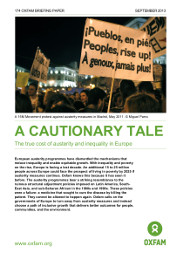 Oxfam has recently published a report alarming the public of the consequences of the austerity measures used to equalize the EU economies after the debt crises. The mechanisms used, have increased the risk of poverty in Europe as people are increasingly burdened by the taxes being enforced on them. Oxfam has released four recommendations that governments must implement to create a fairer society.
Oxfam has recently published a report alarming the public of the consequences of the austerity measures used to equalize the EU economies after the debt crises. The mechanisms used, have increased the risk of poverty in Europe as people are increasingly burdened by the taxes being enforced on them. Oxfam has released four recommendations that governments must implement to create a fairer society.
23 September, 2013| Oxfam
A cautionary tale. The true cost of austerity and inequality in Europe
Oxfam’s new report, A Cautionary Tale, finds that austerity measures introduced to balance the books following the €4.5 trillion bank bail-out are failing to cut debt ratios, or trigger inclusive economic growth.
European austerity programs have instead dismantled the mechanisms that reduce inequality and enable equitable growth. If left unchecked, they could put between 15 and 25 million more Europeans at risk of poverty by 2025. This would bring the number of people at risk of poverty in Europe up to 146 million, over a quarter of the population. It could take Europeans up to 25 years to regain the living standards they enjoyed five years ago, warns Eurodad member organization Oxfam.
The austerity programs bear a striking resemblance to the ruinous structural adjustment policies imposed on Latin America, South-East Asia, and sub-Saharan African in the 1980s and 1990s. These policies were a failure: a medicine that sought to cure the disease by killing the patient. They cannot be allowed to happen again.
Oxfam calls on the governments of Europe to turn away from austerity measures and instead choose a path of inclusive growth that delivers better outcomes for people, communities, and the environment.
The case studies and full report in English, French, Italian and Spanish are available on Oxfam’s website.
Key recommendations
European governments must:
1. Invest in people and economic growth:
- prioritize an economic stimulus programme, promoting investments and capital spending;
- target employment creation;
- protect EU and member states’ overseas development aid budgets.
2. Invest in public services:
- guarantee public, universal, high-quality education for all;
- protect public, universal, high-quality health care and develop social protection systems that enable the most vulnerable to live with dignity and lift themselves out of poverty.
3. Strengthen institutional democracy:
- promote greater participation in democratic processes by all stakeholders;
- ensure greater transparency and accountability of political processes;
- improve workplace democracy, including better employee representation and opportunities for greater shared ownership.
4. Build fair tax systems:
- implement progressive taxation reforms, including a tax on wealth stocks and a Financial Transaction Tax;
- tackle tax avoidance and evasion, including transparency and exchange of financial information, new international tax rules listing tax havens.
For the Oxfam report:
http://www.oxfam.org/sites/www.oxfam.org/files/bp174-cautionary-tale-austerity-inequality-europe-120913-en_1.pdf
Oxfam website:
http://www.oxfam.org/en/policy/cautionary-tale-austerity-inequality-europe
